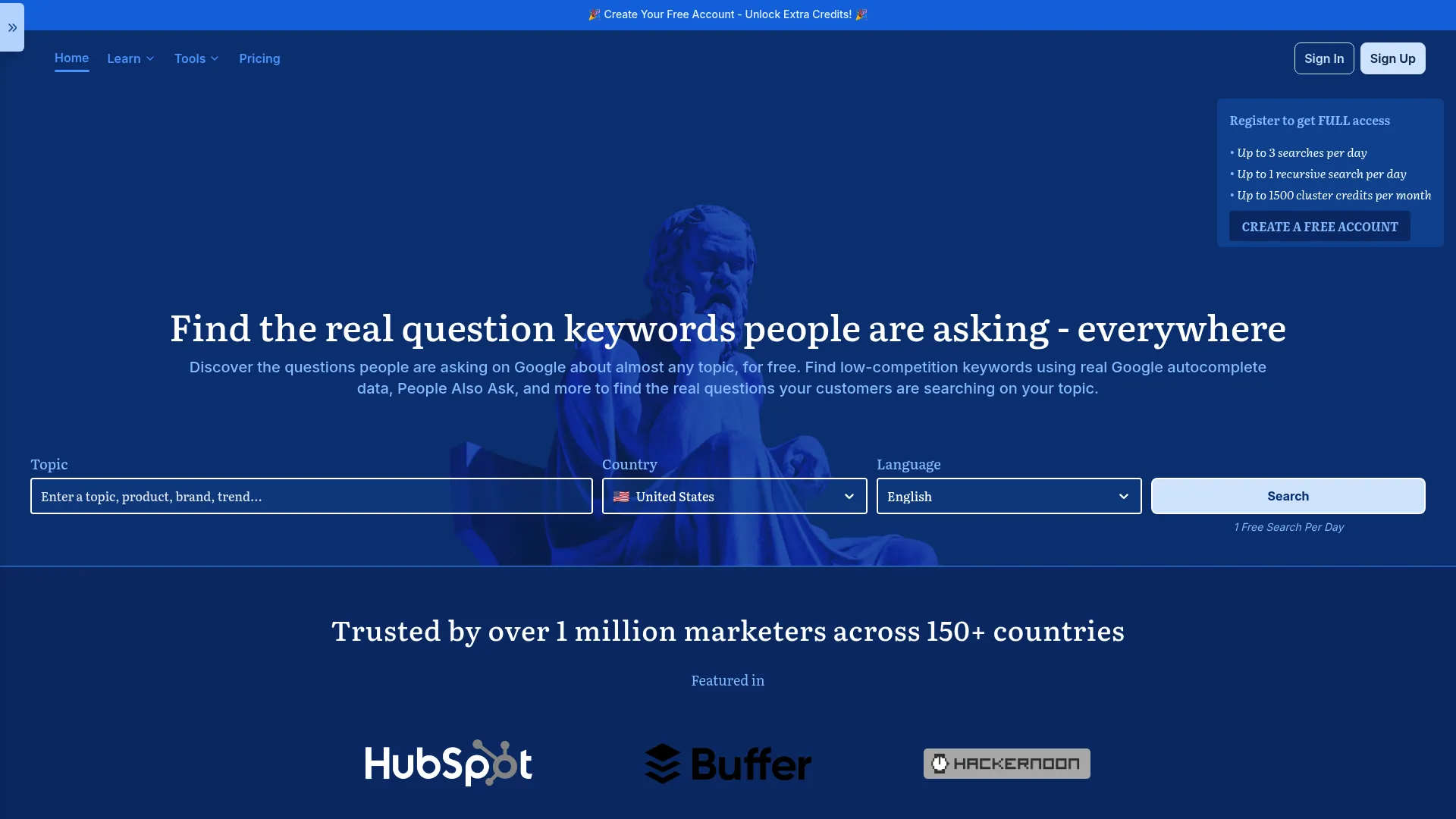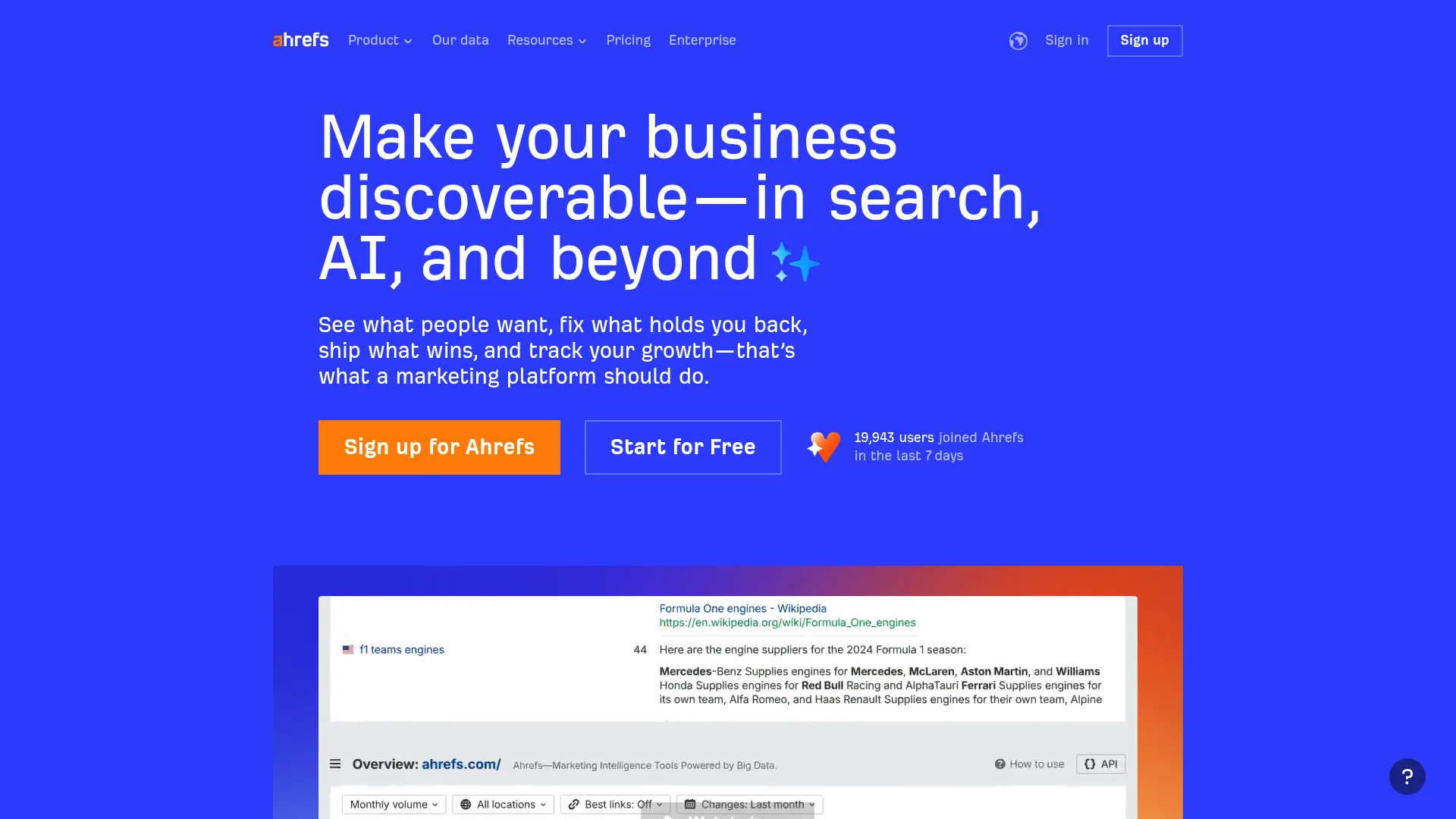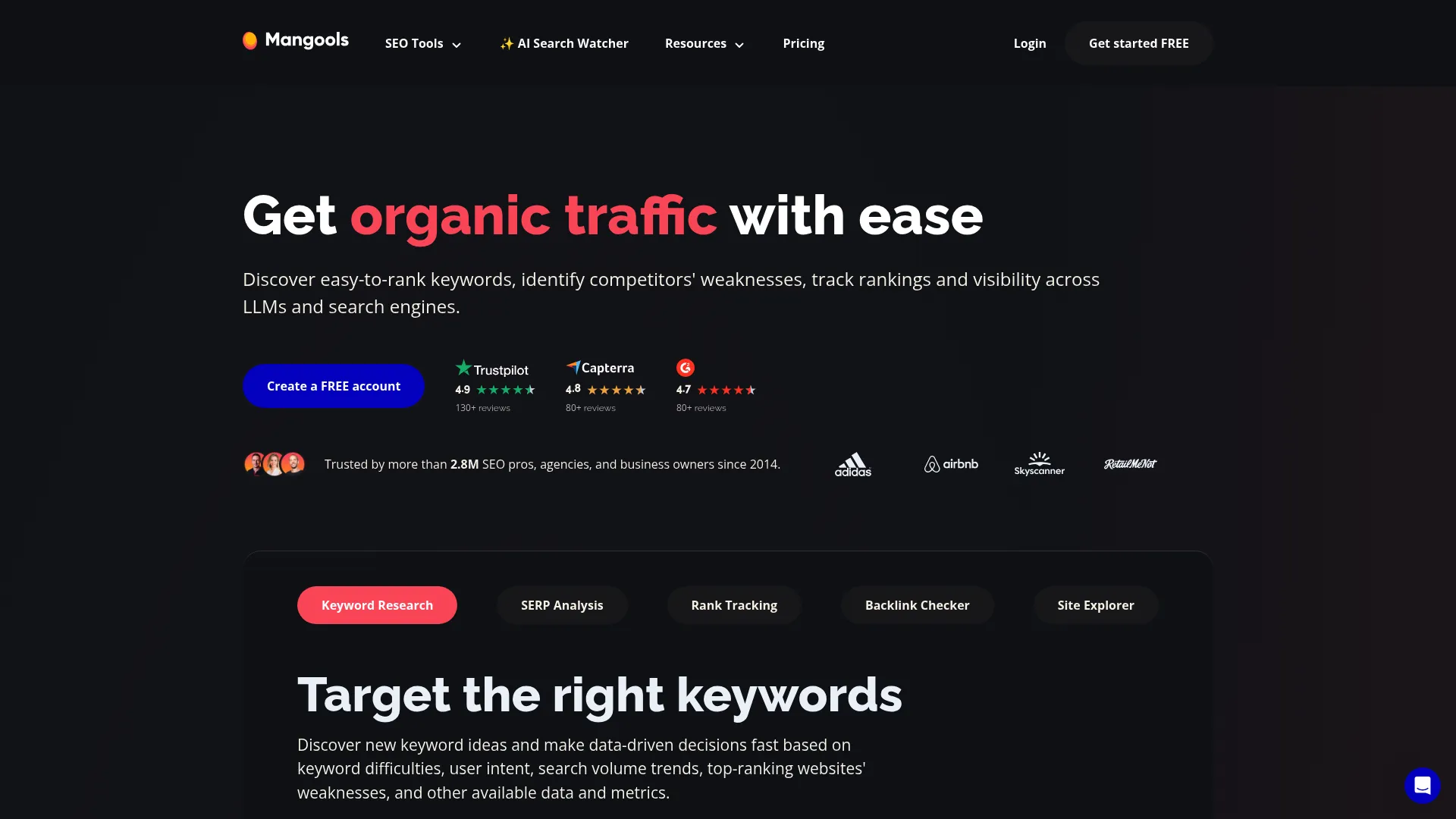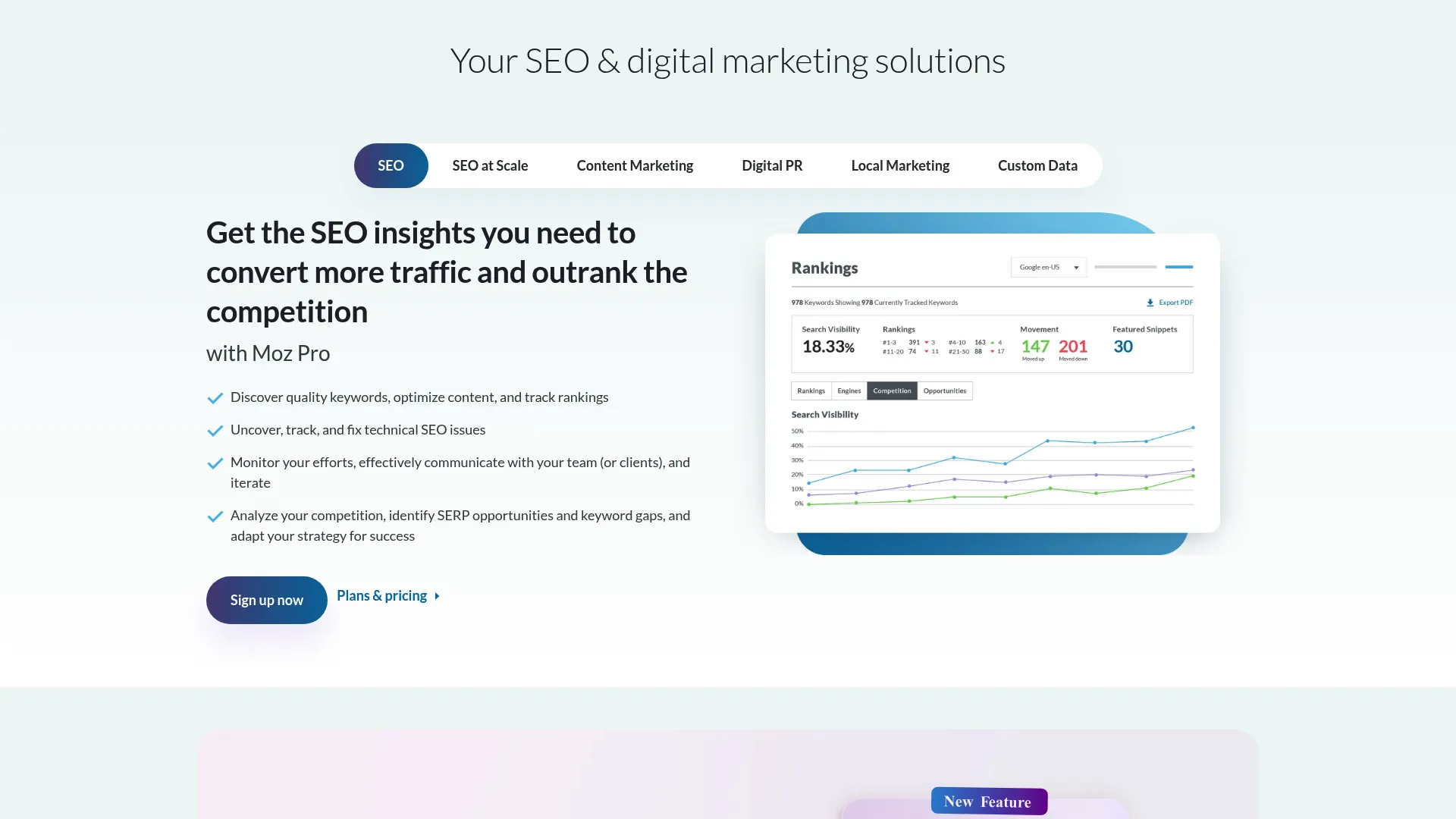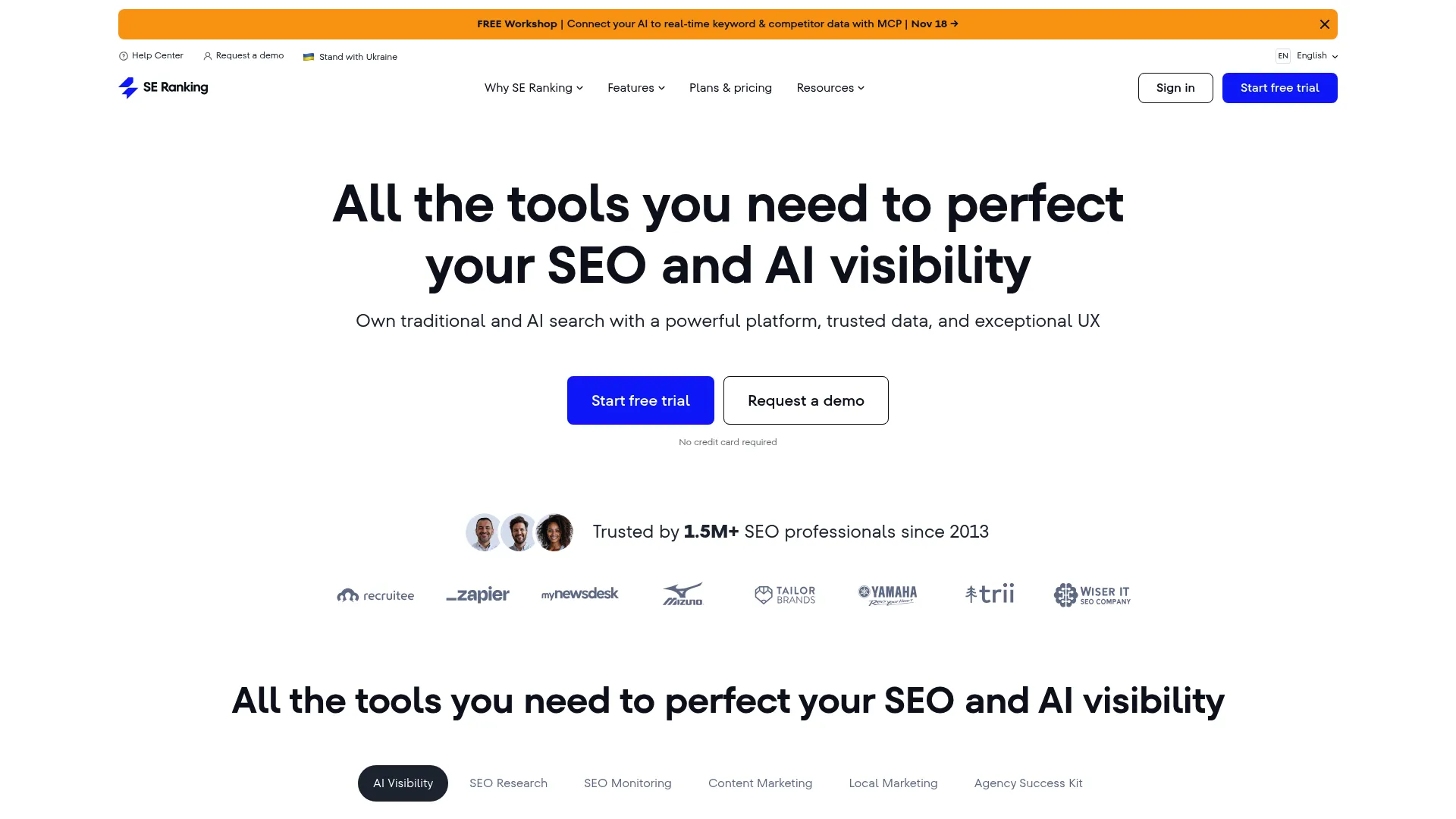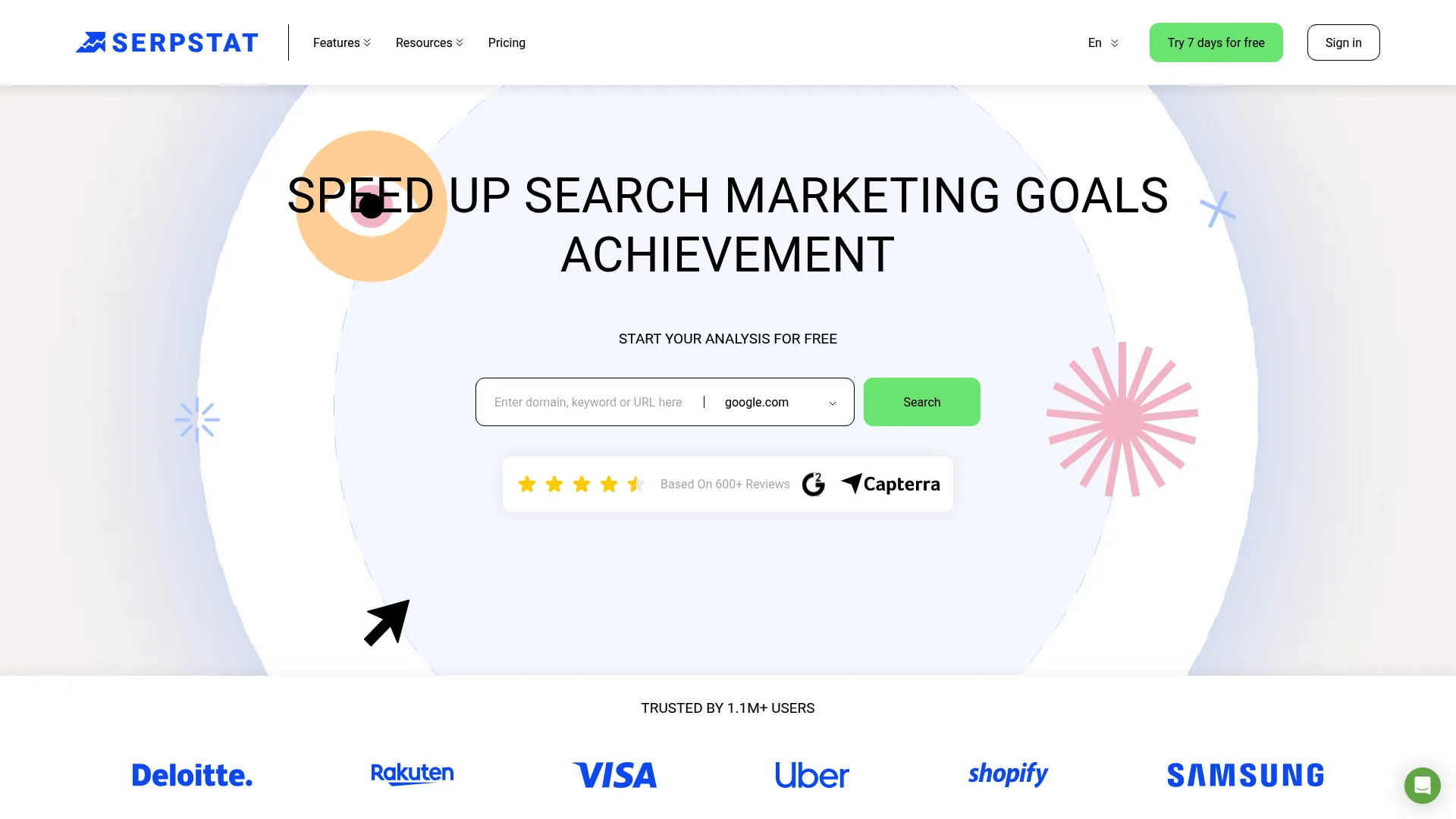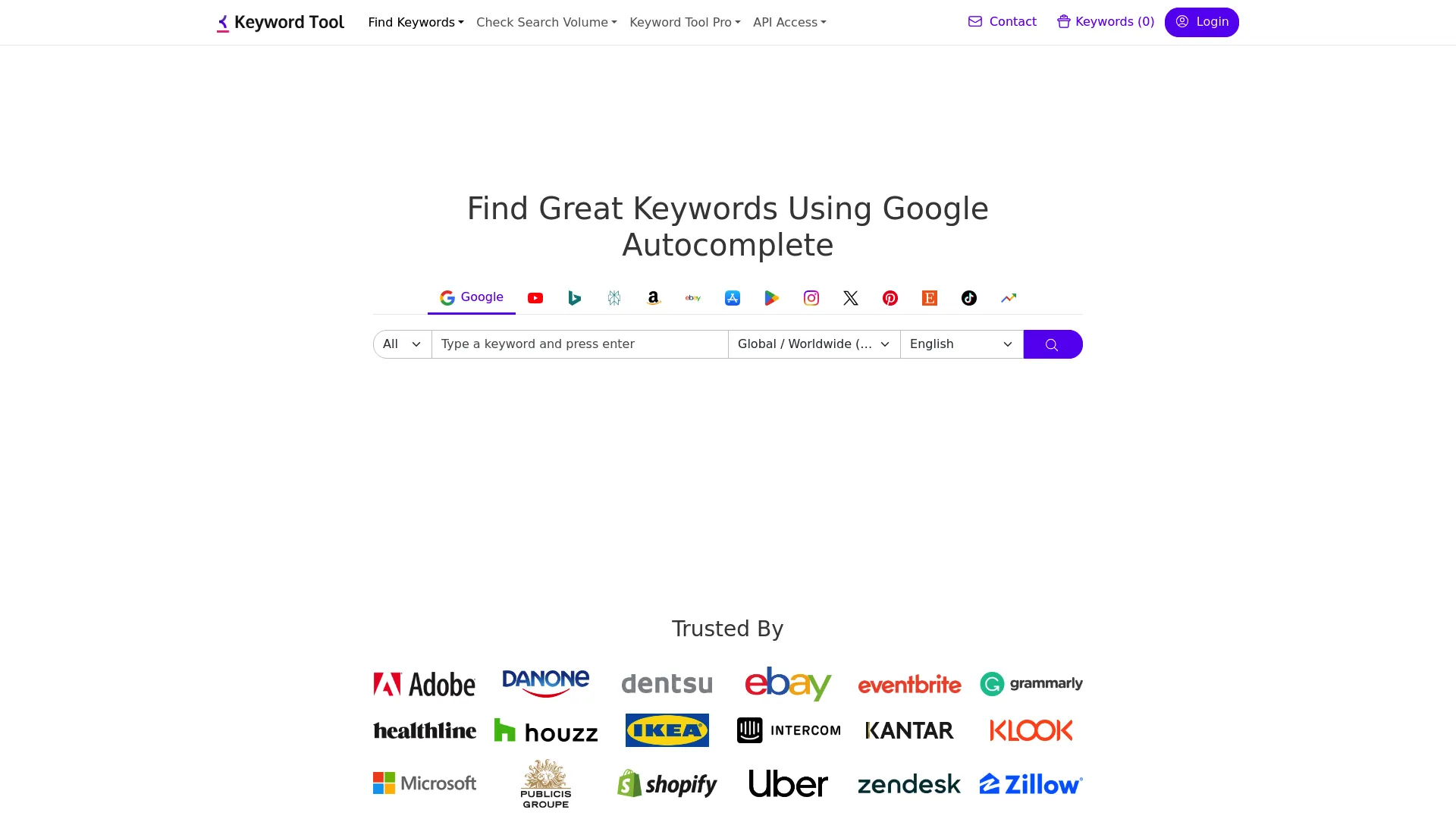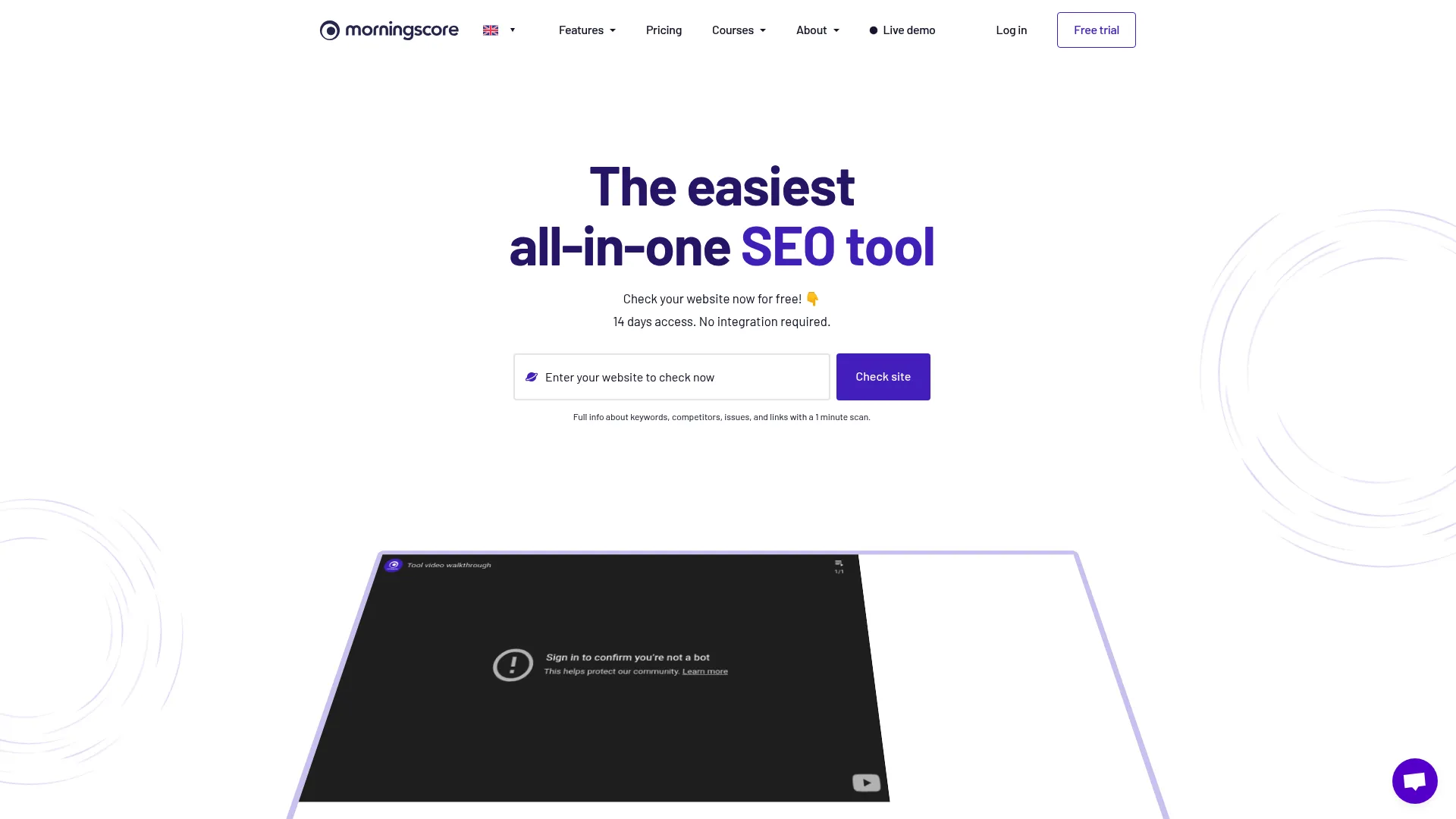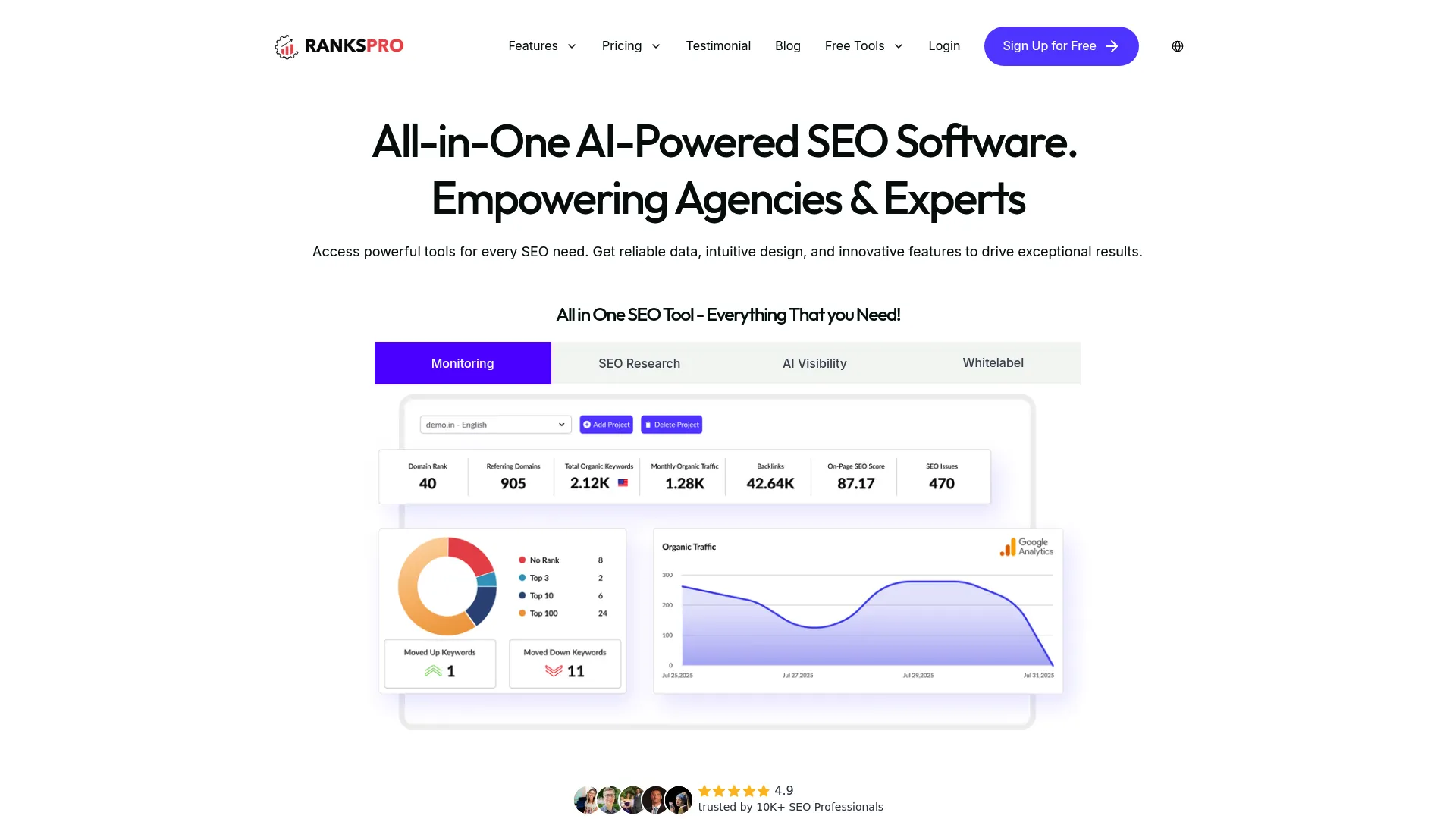Look, I’ve talked to tons of marketers lately, and most of them are pretty fed up with their current SEO tools – especially Ubersuggest users. Been there, done that. Started with Ubersuggest because, hey, free stuff is great, right? But man, those limitations hit you fast when you’re trying to actually scale your content.
After testing dozens of alternatives over the past year, I’ve put together this breakdown of the tools that actually deliver on their promises. Here’s the thing – while Ubersuggest serves as a decent starting point, serious marketers quickly outgrow its capabilities. Whether you’re dealing with wonky search volume data, hitting usage limits at the worst possible moments, or just needing more sophisticated analysis features, these alternatives fix those exact headaches.
Each tool I’ve picked is really good at certain things that matter most to growing businesses. Some crush it at backlink analysis, others revolutionize how you organize keywords, and a few give you enterprise-level features without the crazy price tags. The trick is matching what’s driving you nuts with the right platform’s strengths.
Table of Contents
-
TL;DR: Quick Picks for Busy Marketers
-
Comparison Table
-
Criteria Breakdown Summary
-
Answer Socrates – Best Known for Advanced Clustering
-
Semrush – Best Known for Enterprise Features
-
Ahrefs – Best Known for Backlink Intelligence
-
Mangools (KWFinder) – Best Known for Beginner-Friendly Interface
-
Moz Pro – Best Known for Authority Metrics
-
SE Ranking – Best Known for Agency Solutions
-
Serpstat – Best Known for Budget Value
-
Keyword Tool – Best Known for Keyword Volume
-
Morningscore – Best Known for Gamified Experience
-
RanksPro – Best Known for AI Integration
-
Notable Mentions
-
FAQ
-
Final Thoughts
TL;DR: Quick Picks for Busy Marketers
Best Overall Value: Answer Socrates has this really cool way of organizing keywords that actually makes sense, plus generous free features that don’t suck. I’ve watched teams completely transform their content strategies using its recursive search thing.
Enterprise Choice: Semrush gives you tons of useful features if you’re a large organization willing to invest in the good stuff.
Backlink Champion: Ahrefs absolutely dominates with the biggest link database out there – their crawler is genuinely impressive.
Beginner Favorite: Mangools delivers gorgeous design without dumbing things down, making SEO way less intimidating for newcomers.
Authority Standard: Moz Pro maintains those Domain Authority metrics that everyone still talks about and references.
Agency Solution: SE Ranking is pretty solid with white-label reporting that clients actually appreciate getting.
Budget Winner: Serpstat gives you a full SEO toolkit at competitive pricing without cutting corners on the important stuff.
Keyword Generator: Keyword Tool produces way more suggestions than Ubersuggest across multiple platforms.
User Experience: Morningscore gamifies SEO to keep teams motivated – surprisingly effective for maintaining momentum.
AI Innovation: RanksPro integrates modern AI features at affordable rates, representing where SEO tools are headed.
These alternatives each solve specific problems that Ubersuggest users commonly run into. The key is figuring out which limitations annoy you most, then picking the tool that fixes those exact pain points.
Comparison Table
|
Tool |
Best For |
Starting Price |
Free Plan |
Key Strength |
Data Accuracy |
Scalability |
|---|---|---|---|---|---|---|
|
Answer Socrates |
Advanced Clustering |
$9/month |
Yes (3 searches daily) |
Keyword clustering & intent classification |
4/5 |
4/5 |
|
Semrush |
Enterprise Features |
$139.95/month |
Limited |
Most comprehensive feature set |
5/5 |
5/5 |
|
Ahrefs |
Backlink Intelligence |
$129/month |
No |
Largest backlink database |
5/5 |
5/5 |
|
Mangools |
Beginner-Friendly |
$31.85/month |
No |
Intuitive interface design |
4/5 |
3/5 |
|
Moz Pro |
Authority Metrics |
$49/month |
No |
Industry-standard DA/PA metrics |
4/5 |
3/5 |
|
SE Ranking |
Agency Solutions |
$65/month |
No |
White-label reporting |
4/5 |
4/5 |
|
Serpstat |
Budget Value |
$69/month |
No |
Comprehensive features at low cost |
4/5 |
4/5 |
|
Keyword Tool |
Keyword Volume |
Varies |
Yes (limited) |
2x more keyword suggestions |
4/5 |
3/5 |
|
Morningscore |
Gamified Experience |
Contact for pricing |
14-day trial |
User engagement & motivation |
4/5 |
3/5 |
|
RanksPro |
AI Integration |
$19/month |
Yes |
AI-enhanced keyword research |
4/5 |
4/5 |
Criteria Breakdown Summary
Picking the right Ubersuggest alternative means looking at six things that directly impact whether your SEO actually works. Data accuracy is everything – unreliable search volumes or outdated keyword difficulty scores can completely derail your campaigns. I’ve seen teams waste months chasing keywords with inflated search volumes.
Keyword research capabilities vary like crazy between tools. Some are great at broad discovery while others specialize in long-tail opportunities or figuring out search intent. Your content strategy determines which approach works best for you.
User interface complexity can make or break whether your team actually uses the tool. Platforms with steep learning curves often sit unused despite having powerful features. Think about your team’s technical expertise when evaluating options.
Pricing structures are way more complicated than just monthly costs. Usage limits, project restrictions, and team collaboration features affect real-world value. Calculate your actual needs before committing to annual plans.
Feature completeness determines whether you need multiple tools or one solution that handles everything. All-in-one platforms offer convenience but specialized tools often go deeper in specific areas. Scalability ensures your investment grows with your business. Switching tools disrupts workflows and requires retraining, making long-term viability crucial for sustainable growth.
Here’s the thing – the most expensive alternative isn’t necessarily the best choice for your situation. I’ve watched small teams achieve better results with focused tools than enterprises struggling with overcomplicated platforms they barely use.
Answer Socrates – Best Known for Advanced Clustering
Look, Answer Socrates is one of those tools that completely changed how I think about keyword research. Instead of getting buried under thousands of random keywords, it actually groups them in ways that make sense for real content planning.
Here’s what’s cool about it – the tool digs into Google Suggest and those “People Also Asked” boxes to build these comprehensive keyword maps. But the real magic happens with their recursive search thing. You start with one keyword and it keeps digging deeper, finding all these related questions and topics your competitors probably missed.
What really sold me on Answer Socrates is how it turns chaos into order. You know that feeling when you export 5,000 keywords and have no clue what to do with them? Yeah, this tool fixes that headache.
Features
The clustering algorithm is honestly pretty impressive – it automatically sorts related keywords into themes that actually make sense. No more spending hours trying to figure out which keywords belong together.
Their recursive search is where things get interesting. Start with something broad like “dog training” and watch it uncover increasingly specific stuff like “how to stop puppy from biting furniture legs.” It’s like having a research assistant who never gets tired of digging deeper.
They also label keywords by funnel stage (TOFU/MOFU/BOFU), which is super helpful when you’re planning content. Finally, someone who gets that not all keywords serve the same purpose.
Oh, and you can download CSV files even on the free plan. Most tools make you pay for that privilege, which always bugged me.
Pros
The free plan is actually useful – three searches daily plus CSV downloads without needing your credit card. That’s rare these days.
The keyword clustering blows Ubersuggest out of the water. It finds connections between keywords that I would never have spotted manually, saving me hours of work.
For content strategy, this tool is gold. You can quickly see gaps in your content and plan comprehensive coverage without missing important angles.
The interface doesn’t try to be fancy – it just works. New team members can jump in without a training manual.
Cons
If you need detailed backlink analysis, you’re out of luck. This tool is laser-focused on keyword research, which means you’ll need something else for link intelligence.
No rank tracking either. So if you want to monitor how your keywords are performing over time, you’ll need to add another tool to your stack.
It’s pretty specialized – great at what it does, but don’t expect it to handle every SEO task under the sun.
My Take
-
Data Quality: Really solid, pulls straight from Google
-
Keyword Research: This is where it shines – best clustering I’ve seen
-
Ease of Use: Simple and clean, anyone can figure it out
-
Bang for Buck: That free tier alone makes it worth trying
-
Complete Package: Nope, it’s specialized for keyword research
-
Room to Grow: Scales well with content marketing needs
What People Are Saying
Content teams love how this tool transforms their planning process. I keep hearing about marketing teams saving tons of time with the automated clustering – no more manually sorting through keyword dumps.
SEO folks especially dig the recursive search for finding those long-tail gems that competitors miss. It’s like having x-ray vision for keyword opportunities.
Source: User reviews from SEO communities and marketing forums
Pricing
Free plan gives you 3 searches daily, 1 recursive search, and CSV downloads. Paid plans start at $9/month for Lite, $29/month for Seneca, and $49/month for Aurelius.
Check out Answer Socrates at their website.
Semrush – Best Known for Enterprise Features
Alright, let’s talk about the 800-pound gorilla in the room. Semrush is basically the Swiss Army knife of digital marketing tools – it does everything, and I mean everything. Sometimes that’s awesome, sometimes it’s overwhelming as hell.
This thing has over 20 billion keywords in its database and covers way more than just SEO. We’re talking PPC, content marketing, social media, competitive intelligence – the works. It’s like having an entire marketing department in software form.
Fair warning though – Semrush can feel like drinking from a fire hose at first. But once you get the hang of it, it’s incredibly powerful for managing complex marketing operations.
Features
The keyword research module is comprehensive – detailed search volumes, keyword difficulty scores, and SERP feature analysis across tons of countries and languages. It’s like having a crystal ball for search trends.
Competitor analysis is where this tool really flexes. It shows you exactly where your competitors are winning and where they’re dropping the ball. You can literally see their entire keyword strategy laid out.
The PPC integration is clutch if you’re running ads. You can analyze competitor ad copy, find profitable keywords, and optimize campaigns all in one place.
Their content toolkit includes an SEO writing assistant that’s actually helpful, plus topic research and content auditing features. It’s like having an editor who knows SEO sitting next to you.
Pros
This is the most complete marketing platform I’ve ever used. Seriously, you could run an entire digital marketing operation from Semrush alone.
The data accuracy is top-notch. They invest serious money in data collection, and it shows in the reliability of their metrics.
For agencies, the white-label reporting and client management features are game-changers. Your clients get professional reports with your branding, which looks incredibly polished.
API access means you can integrate it with pretty much anything, and the team collaboration features actually work well for larger organizations.
Cons
It’s expensive. Like, really expensive. Small businesses often can’t justify the cost, especially when they only need basic SEO features.
The learning curve is steep. There’s so much functionality that it takes weeks to really understand what you’re working with. New users often feel lost.
Sometimes it feels like overkill. If you just need basic keyword research, paying for all these enterprise features doesn’t make sense.
My Take
-
Data Quality: Industry-leading, consistently reliable
-
Keyword Research:
-
Keyword Research: Massive database with advanced filtering
-
Ease of Use: Professional but complex – takes time to master
-
Bang for Buck: Expensive but justified if you use the features
-
Complete Package: Most comprehensive platform available
-
Room to Grow: Scales to enterprise level seamlessly
What People Are Saying
Enterprise users consistently call this their go-to all-in-one solution. Marketing directors love consolidating multiple tool subscriptions into one comprehensive system.
Agency owners rave about the white-label reporting – being able to present professional, branded reports really elevates client relationships.
SEO pros praise the data accuracy and competitive analysis depth. Many consider it essential for understanding market landscapes.
Source: Enterprise user reviews and agency testimonials
Pricing
Pro starts at $139.95/month, Guru at $249.95/month, Business at $499.95/month. Annual subscriptions knock off a decent chunk if you’re committed long-term.
Access Semrush at their platform.
Ahrefs – Best Known for Backlink Intelligence
If you’re serious about understanding backlinks, Ahrefs is basically the gold standard. They’ve got the second-largest web crawler after Google, which means their backlink database is absolutely massive – we’re talking over 22 trillion links.
When I need to figure out why a competitor is crushing it in search results, Ahrefs gives me the clearest picture of their link profile and content strategy. The depth of data here is honestly impressive.
Beyond backlinks, they’ve built a solid all-around SEO platform with keyword research, site auditing, and rank tracking. But let’s be real – people choose Ahrefs for the link intelligence.
Features
The backlink database is insane – 22+ trillion links that they update constantly through aggressive crawling. If a link exists, Ahrefs probably knows about it.
Keyword Explorer gives you detailed metrics including actual click-through rates and search volume trends. Plus, they show you what SERP features are triggered, which is super helpful for content planning.
Site Audit crawls your website for technical issues and gives you actionable recommendations. It’s like having a technical SEO expert review your site automatically.
Content Gap analysis is brilliant – it shows you keywords where competitors rank but you don’t. Makes it easy to spot quick wins for content optimization.
Pros
The backlink data accuracy is unmatched. Their crawling infrastructure is so comprehensive that you get the most complete view of link landscapes available.
Competitive research capabilities are incredible. You can reverse-engineer competitor strategies across multiple channels and identify what’s actually working for them.
Despite being super powerful, the interface is well-designed and doesn’t feel overwhelming. Even complex analysis feels manageable.
They’re constantly adding new features based on user feedback. The platform keeps getting better, which is rare in this space.
Cons
It’s pricey. The comprehensive feature set comes with a hefty monthly bill that smaller businesses might struggle with.
Content optimization features aren’t as strong as specialized platforms. If content creation is your main focus, you might need additional tools.
While the interface is good, there’s still a learning curve. The platform’s power requires some investment to use effectively.
My Take
-
Data Quality: Best in class, consistently accurate
-
Keyword Research: Excellent database with unique insights
-
Ease of Use: Well-designed despite being feature-rich
-
Bang for Buck: Premium pricing but features justify the cost
-
Complete Package: Comprehensive SEO toolkit
-
Room to Grow: Scales perfectly with business growth
What People Are Saying
SEO professionals consistently rank this as their top choice for backlink analysis and competitive research. The data accuracy makes it indispensable for serious link building.
Content marketers love the keyword research and content gap analysis. Many report major improvements in content strategy after implementing Ahrefs’ insights.
Agency owners value the reliability and professional reporting. Client presentations benefit from Ahrefs’ authoritative data and clear visualizations.
Source: SEO professional surveys and industry testimonials
Pricing
Lite starts at $129/month, Standard at $249/month, Advanced at $449/month, Enterprise at $1,499/month. All plans include core features with different usage limits.
Check out Ahrefs at their website.
Mangools (KWFinder) – Best Known for Beginner-Friendly Interface
Mangools is like the friendly neighborhood of SEO tools – everything is beautiful, intuitive, and doesn’t make you feel like you need a PhD to use it. KWFinder, their main tool, focuses on finding low-competition keywords that beginners can actually rank for.
This is the tool I recommend to people who are intimidated by SEO. The interface is gorgeous, the data is presented clearly, and they don’t overwhelm you with features you’ll never use.
Features
KWFinder excels at long-tail keyword discovery with super intuitive search and filtering. It identifies opportunities with difficulty scores that actually match your domain’s authority level – no more chasing impossible keywords.
SERPChecker gives you detailed competitor analysis for any keyword, showing domain authority, page authority, and social signals for top-ranking pages. It’s like having a scout report on your competition.
SERPWatcher tracks your keyword rankings with beautiful charts and progress indicators. Finally, rank monitoring that doesn’t require a statistics degree to understand.
LinkMiner analyzes backlink opportunities by examining competitor profiles. You can spot potential link sources and evaluate their quality through clear metrics.
Pros
The interface is absolutely gorgeous and incredibly easy to use. New users can jump right in without feeling overwhelmed or confused.
Pricing is really reasonable for what you get. Small businesses and freelancers can access professional-grade tools without breaking the bank.
The data visualizations are beautiful and make complex SEO metrics understandable at a glance. Charts and graphs actually help you identify trends quickly.
They focus on low-competition keywords, which is perfect for beginners who need realistic ranking goals instead of impossible targets.
Cons
The keyword database isn’t as large as premium competitors. If you’re in a super competitive industry, you might find limited suggestions.
Advanced features are somewhat limited for enterprise needs. Larger organizations might outgrow the platform’s capabilities pretty quickly.
Backlink analysis is basic compared to specialized tools. If you need deep link intelligence, you’ll need something more robust.
My Take
-
Data Quality: Solid and reliable, occasional gaps in competitive markets
-
Keyword Research: Great for long-tail discovery, smaller database
-
Ease of Use: Best-in-class design and usability
-
Bang for Buck: Excellent value for what’s included
-
Complete Package: Good toolkit with some limitations
-
Room to Grow: Might need upgrades as expertise grows
What People Are Saying
Beginners consistently praise Mangools for making SEO accessible and understandable. Lots of success stories about ranking improvements using their low-competition keyword suggestions.
Small business owners love the affordable pricing and immediate usability. You can start doing effective SEO without extensive training or technical knowledge.
Freelancers value the professional reporting and client-friendly visualizations. The beautiful interface helps explain SEO concepts to clients effectively.
Source: Beginner SEO community feedback and small business testimonials
Pricing
Basic at $31.85/month, Premium at $44.85/month, Agency at $83.85/month. Annual billing saves you a good chunk of money across all tiers.
Visit Mangools at their platform.
Moz Pro – Best Known for Authority Metrics
Moz is like the grandfather of SEO tools – they’ve been around forever and established the industry standards that everyone else follows. Their Domain Authority and Page Authority metrics are referenced in pretty much every SEO conversation you’ll ever have.
Beyond the famous authority metrics, they’ve built a solid SEO platform backed by some of the best educational resources in the industry. If you’re learning SEO, Moz’s guides are basically required reading.
Features
Domain Authority and Page Authority are the industry benchmarks for website evaluation. These scores help you assess link value, competitive landscapes, and optimization priorities – everyone knows what DA means.
Keyword Explorer provides clear difficulty assessments with transparent scoring. Unlike other tools that use mysterious algorithms, Moz explains why keywords get specific difficulty ratings.
Site Audit crawls your website for technical issues and provides actionable recommendations. The crawler finds problems that impact search performance and tells you exactly how to fix them.
Link Research helps identify quality backlink opportunities while avoiding potentially harmful links. The spam score feature protects you from dangerous link building practices.
Pros
Authority metrics have industry-wide recognition and trust. When you mention a site has DA 70, everyone knows exactly what that means – it’s the common language of SEO.
Educational resources are incredible. The platform includes comprehensive guides, webinars, and tutorials that actually teach you SEO fundamentals properly.
Professional interface creates confidence in client presentations. The clean, authoritative appearance enhances credibility when sharing reports with stakeholders.
Great for learning SEO fundamentals. Beginners can build solid foundations before moving to more complex tools.
Cons
Keyword database is smaller than competitors. You might find limited discovery opportunities compared to platforms with larger keyword collections.
Pricing provides fewer features per dollar than alternatives. You might find better value propositions from other platforms offering similar capabilities.
Usage limits can be restrictive for active campaigns. Teams doing extensive research might hit monthly allowances quickly and need plan upgrades.
My Take
-
Data Quality: Reliable metrics with industry recognition
-
Keyword Research: Solid capabilities, smaller database
-
Ease of Use: Professional design, good usability
-
Bang for Buck: Higher cost for the feature set
-
Complete Package: Good toolkit with some gaps
-
Room to Grow: Usage limits might require frequent upgrades
What People Are Saying
SEO consultants frequently cite Moz’s authority metrics in client communications. The standardized scoring system makes it easy to communicate website quality and improvement opportunities.
Marketing teams appreciate the educational resources for internal training. Many organizations use Moz’s learning materials to get their teams up to speed on SEO.
Agency professionals value the trusted brand recognition when presenting to clients. Moz’s reputation enhances credibility in competitive situations.
Source: SEO consultant feedback and agency testimonials
Pricing
Starter at $49/month, Standard at $99/month, Medium at $179/month, Large at $299/month. Each tier has different usage limits and feature access.
Access Moz Pro at their website.
SE Ranking – Best Known for Agency Solutions
SE Ranking is built with agencies in mind – flexible SEO management with white-label reporting that makes your client presentations look incredibly professional. If you’re running an agency, the customization options here can really strengthen client relationships.
The rank tracking is solid and reliable, which is crucial when you’re reporting to clients who want to see their keyword positions moving up.
Features
White-label reporting is where this tool really shines. You can customize reports with your own branding, logos, and color schemes. Your clients get professional documentation that makes you look like you’ve got your act together.
Rank tracking monitors keywords across Google, Bing, Yahoo, and YouTube with location-specific accuracy. The system updates regularly and sends alerts when there are significant position changes – no more manually checking rankings.
Website audit finds technical SEO issues and prioritizes them clearly. The crawler examines your site health and gives you actionable next steps instead of just dumping a list of problems on you.
Competitor analysis reveals keyword gaps and ranking opportunities through detailed comparison reports. You can see what’s working for competitors and adapt those strategies for your own campaigns.
Pros
Great value for what you get – agencies can access professional-grade tools without the crazy costs of enterprise platforms.
Rank tracking accuracy is reliable, which builds trust with clients who depend on accurate performance metrics. Nobody wants to explain why the numbers don’t match reality.
Agency features are thoughtfully designed – white-label options and team collaboration tools actually enhance how you deliver services to clients.
Flexible pricing lets you scale based on actual needs instead of forcing you into oversized plans that waste money.
Cons
Feature set doesn’t match the top-tier competitors. If you need advanced analysis, you might need additional tools for complete SEO management.
Interface feels a bit dated compared to newer platforms. It works fine, but the visual presentation lacks the polish of modern alternatives.
Advanced capabilities are somewhat limited for enterprise-level requirements. Large organizations might outgrow the analytical depth pretty quickly.
My Take
-
Data Quality: Reliable rank tracking with good keyword data
-
Keyword Research: Solid capabilities with room for improvement
-
Ease of Use: Functional design, slightly dated aesthetics
-
Bang for Buck: Good balance of features and cost
-
Complete Package: Comprehensive toolkit with some limitations
-
Room to Grow: Scales well with agency needs
What People Are Saying
Agency owners consistently highlight the white-label reporting as a game-changer. Being able to present professional, branded reports really enhances client relationships and retention.
SEO managers love the reliable rank tracking and automated reporting. Teams can focus on strategy instead of manually collecting data and generating reports.
Small agencies appreciate the affordable pricing that gives them access to professional tools without enterprise budgets.
Source: Agency owner surveys and SEO manager testimonials
Pricing
Essential starts at $65/month, Pro at $119/month, Business at $259/month. Pricing scales based on tracked keywords and included features.
Find SE Ranking at their site.
Serpstat – Best Known for Budget Value
Serpstat is proof that you don’t need enterprise budgets to get serious SEO functionality. This platform delivers comprehensive features at prices that actually make sense for smaller businesses while maintaining solid analytical depth.
The keyword clustering here is genuinely impressive – it automatically organizes related terms into logical groups, which saves hours of manual work and reveals content opportunities you might miss otherwise.
Features
Full SEO toolkit includes keyword research, rank tracking, site auditing, and backlink analysis in one platform. You can manage complete campaigns without buying multiple specialized tools.
Keyword clustering automatically groups related search terms into themes. This organization reveals content opportunities and helps you structure comprehensive topic coverage without the headache.
Missing keywords analysis identifies gaps by comparing your rankings against competitors. It highlights opportunities where competitors rank but you don’t even show up.
Batch keyword analysis processes large keyword lists efficiently, giving you volume and difficulty data for extensive research projects quickly.
Pros
Pricing makes advanced SEO tools accessible to small businesses and freelancers. You get enterprise-level capabilities without the corresponding cost barriers.
Keyword clustering features rival premium platforms. The automatic organization saves tons of time and reveals strategic insights you’d miss manually.
API access enables custom integrations and automated workflows for technical users. This flexibility supports advanced use cases and workflow optimization.
Comprehensive competitor analysis helps identify successful strategies worth copying. The gap analysis features guide content creation priorities effectively.
Cons
Interface can feel overwhelming for new users despite the capabilities. The extensive feature set requires some learning investment to navigate efficiently.
Data accuracy occasionally lags behind industry leaders, especially in competitive markets. You might notice discrepancies when comparing metrics across platforms.
Data refresh delays sometimes impact real-time analysis needs. Teams requiring immediate updates might get frustrated with processing speeds.
My Take
-
Data Quality: Generally reliable with occasional inconsistencies
-
Keyword Research: Strong capabilities including clustering features
-
Ease of Use: Functional but can feel overwhelming
-
Bang for Buck: Excellent value for comprehensive feature set
-
Complete Package: Full toolkit with minor limitations
-
Room to Grow: Scales well with business requirements
What People Are Saying
Budget-conscious marketers consistently praise Serpstat for delivering premium features at accessible prices. Lots of success stories from users who switched from more expensive alternatives.
Content strategists love the keyword clustering that streamlines topic research and content planning. The automatic organization reveals relationships that manual analysis often misses.
Small business owners value the comprehensive feature set that eliminates multiple tool subscriptions.
Source: Small business owner feedback and budget-focused marketer testimonials
Pricing
Individual at $69/month, Team at $129/month, Agency at $499/month. Annual subscriptions provide significant discounts across all tiers.
Explore Serpstat at their platform.
Keyword Tool – Best Known for Keyword Volume
Keyword Tool generates way more keyword suggestions than Ubersuggest while maintaining rock-solid reliability. Their 99.99% uptime guarantee means you can actually count on it being available when research deadlines hit.
What’s cool is the multi-platform approach – it doesn’t just do Google, but also Amazon, YouTube, Instagram, and other search engines. This comprehensive coverage reveals opportunities across different digital channels.
Features
Keyword generation uses Google autocomplete and other search engine suggestion systems to produce extensive keyword lists. It uncovers long-tail variations that competitors often miss completely.
Multi-platform support includes Amazon, YouTube, Instagram, Twitter, and other search engines beyond Google. This diversity enables comprehensive research across various marketing channels.
Advanced keyword operators and negative keyword filtering help refine results for specific campaigns. You can exclude irrelevant terms and focus on keywords that actually align with your goals.
Multi-language and location support enables global keyword research across different markets and regions. Great for international campaigns and localized content strategies.
Pros
Keyword volume significantly exceeds Ubersuggest’s output, giving you more comprehensive research results. You can explore broader keyword landscapes and spot opportunities smaller datasets miss.
Platform reliability through 99.99% uptime guarantee ensures consistent access during critical research periods. You can actually depend on it being available when you need it.
Free tier provides meaningful functionality without requiring payment info. You can evaluate the platform’s capabilities before committing to paid subscriptions.
Multi-platform research reveals opportunities across diverse digital marketing channels beyond traditional search engines.
Cons
SEO metrics are limited in the free version, restricting analysis depth. You need paid subscriptions to access search volume, competition data, and other essential metrics.
No backlink analysis capabilities at all. Teams requiring link intelligence must use additional tools for comprehensive competitive analysis.
Focus on keyword generation limits broader SEO functionality. Organizations needing complete SEO management require supplementary platforms for rank tracking and site auditing.
My Take
-
Data Quality: Reliable keyword suggestions with good coverage
-
Keyword Research: Excellent volume, limited metrics in free tier
-
Ease of Use: Clean, straightforward design
-
Bang for Buck: Good value for keyword generation focus
-
Complete Package: Specialized tool with limited SEO functions
-
Room to Grow: May require additional tools as needs expand
What People Are Saying
Content creators consistently praise Keyword Tool for uncovering keyword variations other platforms miss. The extensive suggestion lists provide inspiration for comprehensive content coverage.
PPC managers appreciate the multi-platform research that supports campaigns across Google, Amazon, and social media channels. The diverse keyword sources enhance targeting options.
SEO researchers value the reliability and consistent performance during intensive research sessions. The guaranteed uptime provides confidence for deadline-driven projects.
Source: Content creator feedback and PPC manager testimonials
Pricing
Free version available with basic functionality. Keyword Tool Pro offers paid plans with enhanced features and metrics. API access available for enterprise users.
Access Keyword Tool at their website.
Morningscore – Best Known for Gamified Experience
Morningscore turns SEO into something that actually feels engaging instead of like homework. The gamified approach addresses a real problem – most SEO tools are abandoned because they’re boring and overwhelming.
Instead of dumping complex dashboards on you, it presents clear action items that build momentum and show progress visually. It’s like having a personal trainer for your SEO efforts.
Features
Gamified interface incorporates XP points, levels, and achievements that make SEO progress feel tangible and rewarding. You can actually see your advancement through clear visual indicators and milestone celebrations.
SEO health overview simplifies complex website analysis into understandable scores and recommendations. The dashboard highlights priority issues without overwhelming you with technical jargon.
Keyword tracking provides essential ranking data with clear progress visualization. Performance changes are presented through intuitive charts and trend indicators that actually make sense.
Competitor analysis dashboard reveals opportunities and threats through simplified competitive intelligence. You can understand your market position without navigating complex data tables.
Pros
User-friendly interface eliminates the intimidation factor that prevents SEO tool adoption. The gamified approach makes optimization tasks feel approachable instead of overwhelming.
Gamification elements maintain engagement over time, reducing tool abandonment rates. Teams stay motivated through progress tracking and achievement recognition systems.
Clear action items help you focus on impactful improvements. The mission-based approach prevents analysis paralysis and encourages consistent progress.
Excellent entry point for SEO beginners who need guidance and motivation. The platform builds confidence through structured learning and visible achievements.
Cons
Advanced features are limited compared to comprehensive SEO platforms. Power users might find the simplified approach restrictive for complex analysis needs.
Keyword database doesn’t match larger competitors’ offerings. Users in competitive markets might encounter limited keyword suggestions and data.
Feature depth sacrifices analytical power for usability gains. Teams requiring detailed technical analysis might need supplementary tools for complete SEO management.
My Take
-
Data Quality: Reliable basic metrics with good presentation
-
Keyword Research: Limited database but well-presented results
-
Ease of Use: Industry-leading gamified design
-
Bang for Buck: Good value for engagement-focused approach
-
Complete Package: Basic toolkit with usability focus
-
Room to Grow: May require upgrades as expertise grows
What People Are Saying
Small business owners consistently praise Morningscore for making SEO accessible and less intimidating. Many report improved consistency in SEO efforts after adopting the gamified approach.
Marketing teams appreciate how the platform encourages regular engagement with SEO tasks. The achievement system helps maintain momentum during long-term campaigns.
SEO beginners value the clear guidance and structured approach to improvement. The platform builds confidence through visible progress and achievable milestones.
Source: Small business owner testimonials and beginner SEO feedback
Pricing
14-day free trial available without credit card requirements. Paid plans start at competitive rates with transparent pricing and no hidden fees.
Try Morningscore at their platform.
RanksPro – Best Known for AI Integration
RanksPro is one of the newer players that’s actually doing something interesting with AI in SEO. Instead of just slapping “AI-powered” on everything, they’re using machine learning to enhance traditional workflows in ways that actually make sense.
Real-time search volume and CPC data provide current market insights instead of outdated historical averages. The AI features help identify emerging trends and opportunities before competitors catch on.
Features
Real-time search volume and CPC data delivers current market conditions instead of stale historical information. This immediacy helps you capitalize on trending topics and seasonal opportunities.
Search intent classification uses AI algorithms to categorize keywords by user purpose automatically. The system identifies informational, navigational, transactional, and commercial investigation intents without manual analysis.
Location-based keyword filtering enables precise geographic targeting across local and international markets. You can research keywords specific to cities, regions, or countries for localized campaigns.
Multi-country tracking spans 150+ locations worldwide, supporting global SEO campaigns and international market research. The geographic coverage rivals established competitors despite being newer.
Pros
Affordable pricing makes AI-enhanced SEO tools accessible to smaller budgets. The platform democratizes advanced features typically reserved for enterprise subscriptions.
Balanced feature set combines essential SEO functions with modern AI enhancements. You get comprehensive capabilities without paying for unnecessary complexity.
AI-powered enhancements streamline research workflows and improve decision-making accuracy. The machine learning identifies patterns and opportunities that manual analysis might miss.
Strong international support accommodates global businesses and multi-market campaigns. The extensive location coverage enables comprehensive international SEO strategies.
Cons
Newer platform status means evolving features and potential stability concerns. Early adopters might encounter bugs or limitations as the platform matures.
Learning curve exists for users unfamiliar with AI-enhanced SEO tools. The modern approach requires adjustment from traditional keyword research methods.
Less established reputation compared to industry veterans creates uncertainty about long-term viability. Users might hesitate to commit without proven track records.
My Take
-
Data Quality: Good accuracy with AI-enhanced insights
-
Keyword Research: Solid capabilities with modern AI features
-
Ease of Use: Clean design with intuitive AI integration
-
Bang for Buck: Exceptional value for AI-enhanced features
-
Complete Package: Comprehensive toolkit with modern additions
-
Room to Grow: Growing platform with expansion potential
What People Are Saying
Early adopters highlight RanksPro’s innovative approach to traditional SEO challenges. Users appreciate how AI features enhance research efficiency without unnecessarily complicating workflows.
Small agencies value the affordable access to AI-powered SEO tools that were previously cost-prohibitive. The platform enables competitive analysis within modest budgets.
Tech-savvy marketers praise the modern approach to keyword research and intent classification. The AI enhancements provide insights that manual analysis struggles to achieve consistently.
Source: Early adopter feedback and tech-focused marketer testimonials
Pricing
Free plan available for basic functionality testing. Paid plans begin at $19/month with 7-day free trial included. Annual subscriptions offer additional savings.
Discover RanksPro at their platform.
Notable Mentions
Google Keyword Planner
Google Keyword Planner is still valuable for basic keyword validation and PPC planning. While it’s primarily designed for advertisers, you get direct Google data that validates search volumes and identifies broad opportunities. It’s free, which makes it essential for tight budgets, though functionality limitations restrict advanced SEO applications.
Seobility
Seobility specializes in technical SEO analysis and website health monitoring. It excels at finding crawl errors, broken links, and technical issues that impact search performance. More specialized than comprehensive alternatives, but provides deeper technical analysis than general-purpose tools.
SpyFu
SpyFu focuses on competitive intelligence and historical keyword performance data. It reveals competitors’ most profitable keywords and advertising strategies over time, providing insights into long-term campaign evolution. The historical perspective helps understand competitor tactics and identify successful strategies worth adapting.
Surfer SEO
Surfer SEO combines keyword research with AI-powered content optimization guidance. It analyzes top-ranking pages to provide specific recommendations for content length, keyword density, and semantic terms. This integration streamlines content creation by connecting keyword research directly to optimization implementation.
FAQ
What makes these alternatives better than Ubersuggest?
These tools address Ubersuggest’s main limitations: data accuracy, feature depth, and scalability. While Ubersuggest works fine for beginners, growing businesses need more reliable metrics, advanced analysis capabilities, and comprehensive toolsets. Each alternative excels in specific areas – Answer Socrates for clustering, Ahrefs for backlinks, Semrush for enterprise features – providing specialized strengths that Ubersuggest’s generalist approach can’t match.
Which tool offers the best value for small businesses?
Answer Socrates and Mangools provide exceptional value for small businesses through generous free tiers and affordable paid plans. Answer Socrates excels in content strategy development with superior keyword clustering, while Mangools offers comprehensive SEO tools with beautiful, intuitive interfaces. Both deliver professional capabilities without enterprise pricing.
Do I need multiple tools or can one platform handle everything?
Comprehensive platforms like Semrush and Ahrefs can handle most SEO needs within single subscriptions, though specialized tools often provide deeper functionality in specific areas. Your choice depends on budget constraints and feature requirements. Agencies and enterprises typically benefit from all-in-one solutions, while specialists might prefer focused tools that excel in their particular domains.
For teams comparing comprehensive platforms, our detailed Ahrefs vs Semrush analysis breaks down the key differences between these industry leaders.
How important is data accuracy when choosing alternatives?
Data accuracy is absolutely crucial – inaccurate metrics lead to poor decisions and wasted resources. Platforms like Ahrefs and Semrush invest heavily in data collection infrastructure, resulting in more reliable insights than budget alternatives. While perfect accuracy is impossible, choosing tools with strong data reputations prevents costly strategic mistakes based on flawed information.
Which alternatives work best for content marketing teams?
Answer Socrates excels for content strategy through advanced keyword clustering and intent classification. Surfer SEO combines research with content optimization guidance, while Semrush provides comprehensive content marketing toolkits. Content teams benefit most from tools that connect keyword research to actual content creation workflows, rather than platforms focused solely on technical SEO metrics.
Content teams evaluating these alternatives should also consider our comprehensive SEO content tools review for additional insights on optimization platforms.
Final Thoughts
Choosing the right Ubersuggest alternative really comes down to your specific needs, budget, and where you want to be in six months. Here’s what I’ve learned after testing all these tools:
-
Answer Socrates is a no-brainer if you’re doing content strategy – the clustering features alone are worth it
-
Enterprise teams should seriously consider Semrush or Ahrefs for comprehensive capabilities and reliable data
-
Complete beginners will love Mangools’ intuitive design and realistic keyword targeting
-
Agencies need SE Ranking’s white-label reporting and flexible pricing
-
Budget-conscious teams can get professional results with Serpstat or RanksPro
-
Content strategists should prioritize tools with clustering and intent classification features
Look, the SEO landscape keeps changing rapidly, and your tool choice should work for both where you are now and where you’re headed. Many successful businesses actually combine specialized tools instead of trying to find one perfect platform – creating custom toolkits that address their unique needs.
At The Marketing Agency, we get that choosing SEO tools is just the starting line of effective digital marketing. Our team has hands-on experience with all these Ubersuggest alternatives and can help you implement whatever solution fits your business goals best. We’ve seen too many companies get stuck in analysis paralysis or blow money on platforms that don’t match their actual needs.
Beyond tool selection, knowing which metrics actually matter is crucial – our guide on best Ahrefs alternatives explores additional options for teams seeking backlink analysis solutions.
Our approach to market analysis goes way beyond basic keyword research to identify strategic opportunities that drive real business growth. We can help you leverage these tools effectively, turning keyword data into actionable strategies that generate measurable results.
Ready to stop comparing tools and start getting real SEO results? Schedule a free strategy consultation and let’s talk about how we can help you maximize your SEO investment through data-driven strategies that actually work.


